
Hyundai i20 Review

Introduction
Hyundai’s i20 is a small hatchback that’s packed with loads of features as standard, and gives you a driving experience that’s a lot more fun than you might expect.
As a rival to cars like the Ford Fiesta, Volkswagen Polo and the Renault Clio, it’s got stiff competition, but it’s got plenty of talent to make it stand out in the crowd.
Select's rating score* - 3.7 / 5
At a Glance
The i20 hatchback was first introduced in 2008, but this latest, third-generation model was launched in 2020. It’s the best yet, with eye-catching looks, a wide range of trims and plenty of standard features. It’s practical and spacious considering its small size, and it’s fun to drive too, with an agility way in advance of previous versions.
The downside to that is that the ride might be too firm for some, and it’s not quite as engaging behind the wheel as the benchmark for this type of car – the Ford Fiesta. That is, unless you go for the top-spec performance model, called the i20N, which is one of the best hot hatches around.
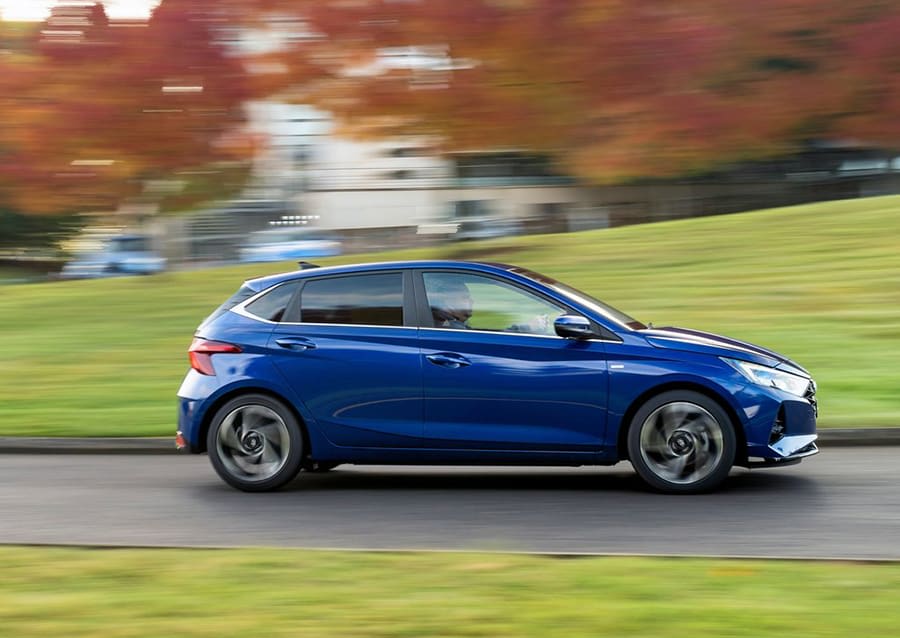
Key Features
Hyundai markets the i20 as a small family hatchback or runabout city car, albeit one that’s at home on the motorway as well as around town. With five main trim levels to choose from, each packed with features for the money, there’s lots of choice for different budgets.
The engine choice isn’t as broad, with just a 1.0-litre, three-cylinder petrol engine available, although you can have it with either a manual gearbox or a dual-clutch automatic. Most versions also have a 48V mild-hybrid system to improve efficiency. There’s also the brilliant i20N hot hatch, which has more than 200 horsepower and sportier suspension.
It’s a proper pocket rocket and a worthy challenger to the Ford Fiesta ST. All versions of the i20 have been designed with an impressive amount of space inside, both for passengers in the cabin and luggage in the boot.
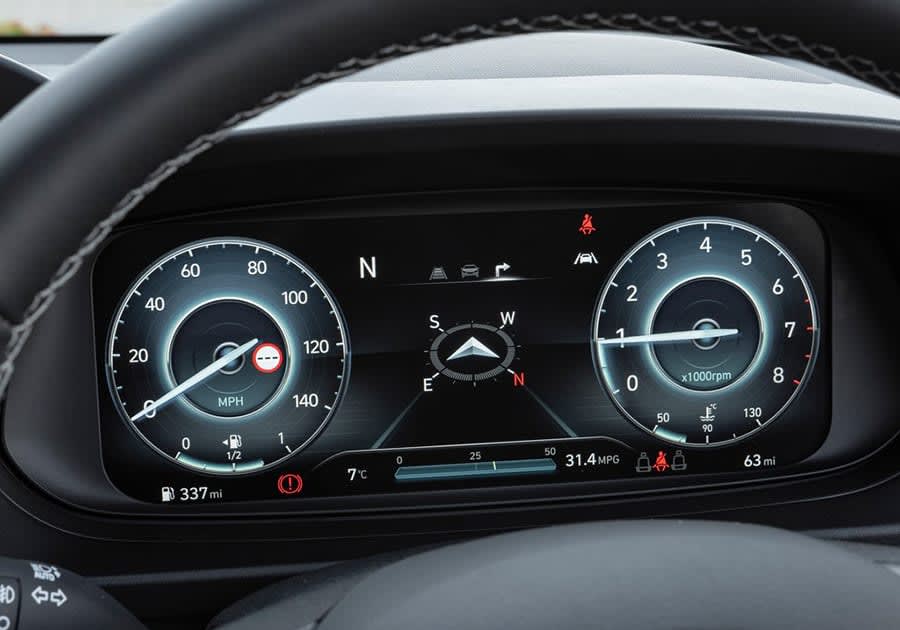
Performance & Drive
The i20 is designed to make life easy around town, with light steering that has plenty of feel, and it’s a doddle to thread through traffic and park. It feels comfortable and confident out on the motorway, and has a surprising agility on open roads.
It feels nimble in a way that a lot of other cars of this type can’t manage, although the payoff is that the ride can feel quite firm, and you’ll feel more of the road surface through the seats than you might want. It’s far from uncomfortable, but the Peugeot 208 feels a bit more supple.
Most versions of the i20 use a 1.0-litre, three-cylinder petrol engine with 100 horsepower and a mild-hybrid system. That’s enough oomph for everyday use, although there are similarly-sized engines on the market that feel a bit more punchy when you accelerate, and you may wish for a bit of extra power when getting up to speed on the motorway.
Rivals like the Fiesta, Seat Ibiza and Volkswagen Polo all have more powerful options, but the only way up in the i20 is with the performance model, which we’ll talk about in a moment.
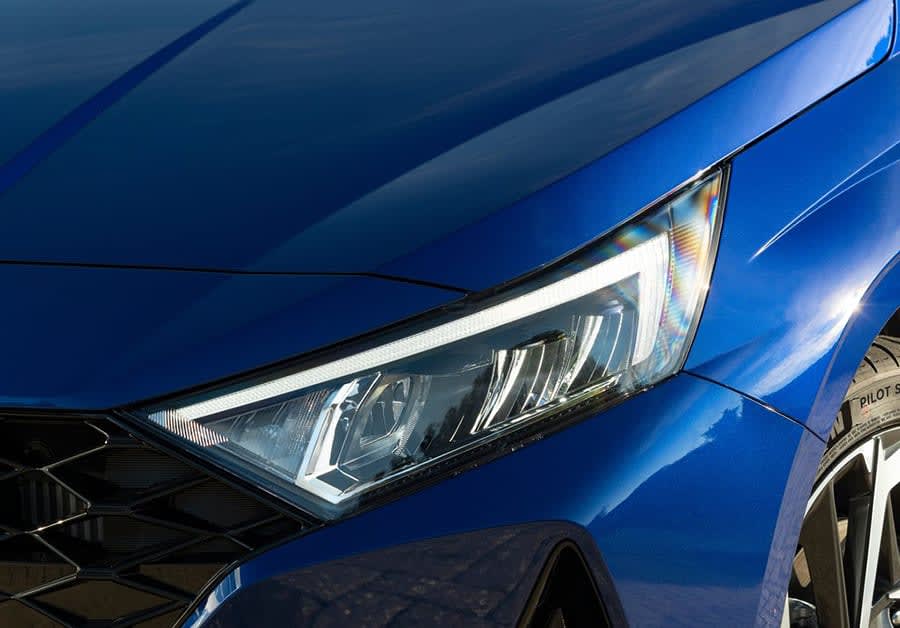
The mild-hybrid system uses a small amount of electrical assistance to take the strain off the petrol engine, but doesn’t allow you to drive on electric power alone in the manner of a Toyota Yaris Hybrid. There are no full-hybrid options in the i20 range, and no full-electric versions either.
The entry-level i20 Element does without the mild-hybrid system, while the performance i20N uses a four-cylinder, 1.6-litre turbo petrol engine with 204hp. This hot hatch is a proper pocket rocket, which pulls really well on acceleration.
Weighty steering and a feeling of agility and confidence make it hugely entertaining to drive on an open country road. Is it quite as good as the Ford Fiesta ST? Maybe not quite, but it’s only a whisker behind.
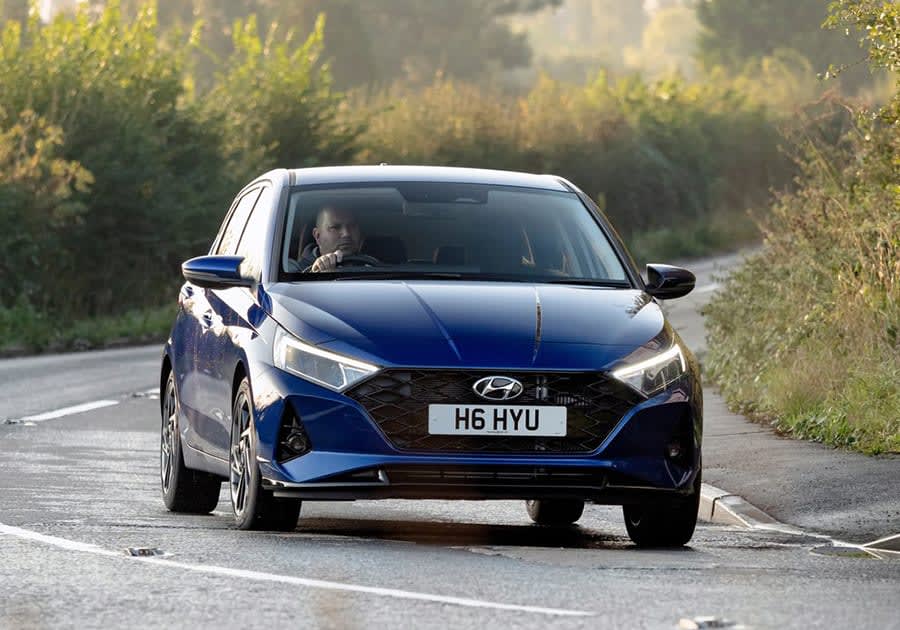
Running costs & Emissions
Leasing costs for the i20 aren’t quite as affordable as the popular Ford Fiesta, although they’re far from expensive. You can also get into a Volkswagen Polo or Peugeot 208 for less per month, but the i20’s prices are very similar to the Peugeot 208.
The 1.0-litre engine will give an official MPG of up to 55.4 with a manual gearbox, or 54.3mpg with the automatic. The entry-level Element trim, without the mild-hybrid system, promises up to 53.3mpg, while the performance i20N will give you up to 40.4mpg.
These are pretty good figures, and although you’ll get better fuel economy from a plug-in hybrid or full-hybrid rival, you’ll usually find that they’re more expensive to lease.
Insurance should be pretty affordable, with insurance groups of between 12 and 16 (of 50) depending on model. However, Fiesta insurance groups go as low as 2.
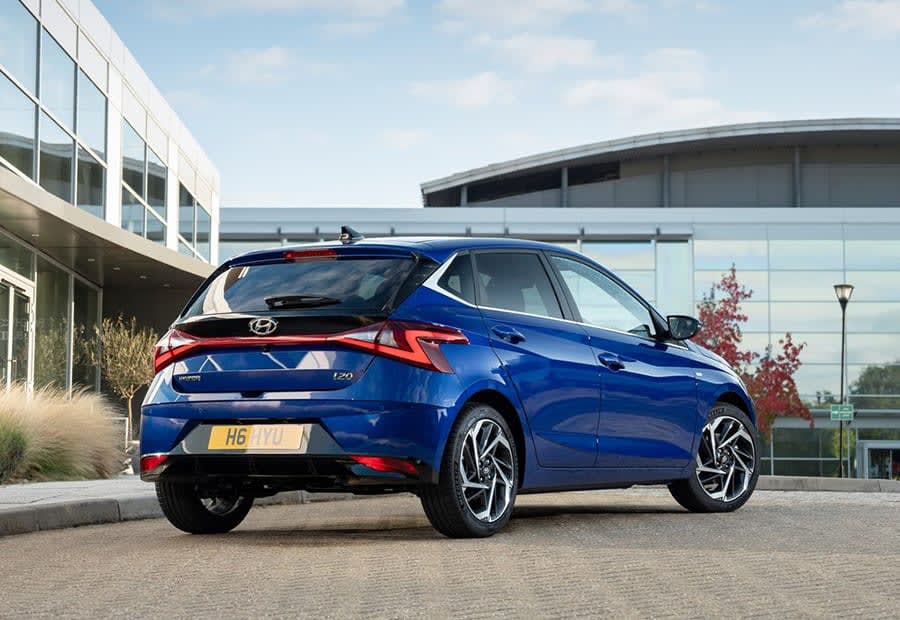
Interior & Technology
The i20’s funky exterior isn’t mirrored by the interior, which is a more restrained, understated design.
An unusual steering wheel design livens things up a bit, and there’s a nice big touchscreen in the centre of the dashboard, with a large digital screen behind the steering wheel instead of traditional analogue dials on every model except the entry-level Element.
What the cabin lacks in funkiness it makes up for in material quality and build though, with everything feeling rock-solid and well screwed together.
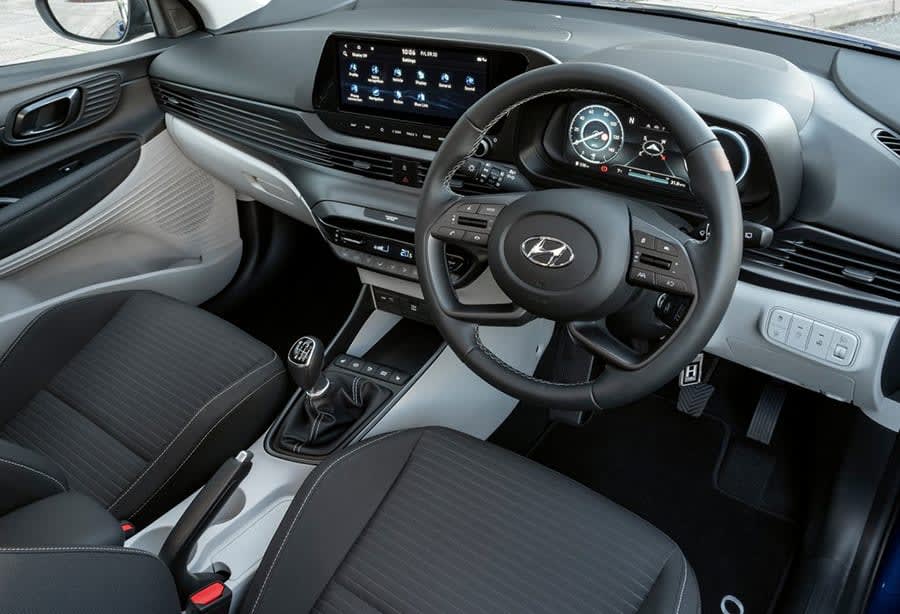
The infotainment system is controlled by an 8.0-inch touchscreen on lower-end models and a 10.25-inch version on higher-spec cars. The lower-spec system is actually a bit easier to use as it has physical buttons to jump between different features, while the larger version uses touch-sensitive panels below the screen.
These aren’t as easy to operate while driving, although the larger screen does look nicer.
The system itself is easy to navigate around and is quick to respond, even if it doesn’t have the flashy graphics of, say, Peugeot. The 10-25-inch screen also features satnav, while all versions have Apple CarPlay and Android Auto for easy smartphone connectivity.
Top-spec Ultimate models get an upgraded Bose sound system and a wireless mobile phone charging pad. The latter is also standard on the i20N, while the Bose system is optional.
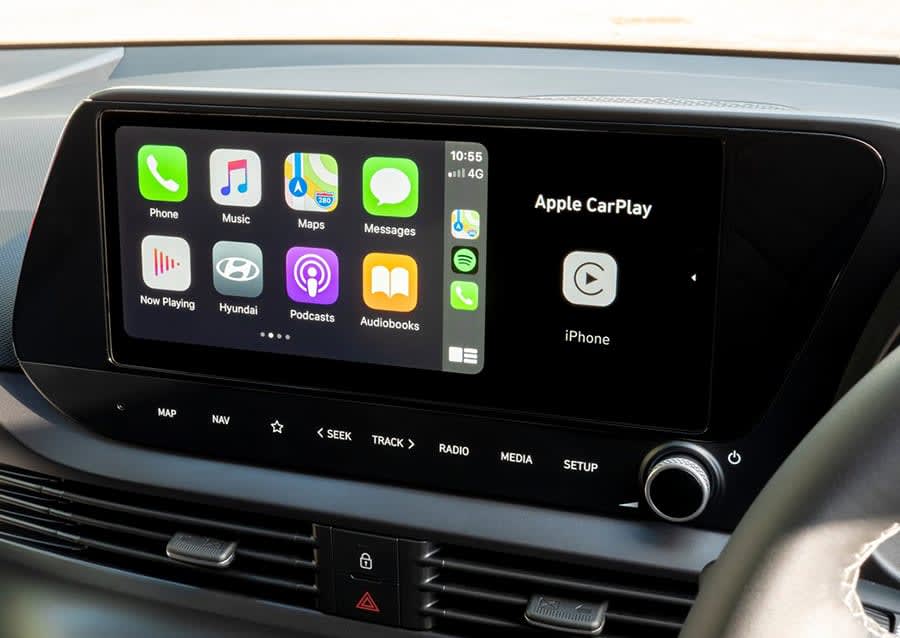
Practicality & Boot Space
This generation of the i20 might be bigger than its predecessors, but it’s still a relatively small car, almost exactly the same size as a Ford Fiesta. However, the designers have done an excellent job maximising its interior space. Rear headroom is impressive for two adults, even tall ones, and kids will have plenty of room.
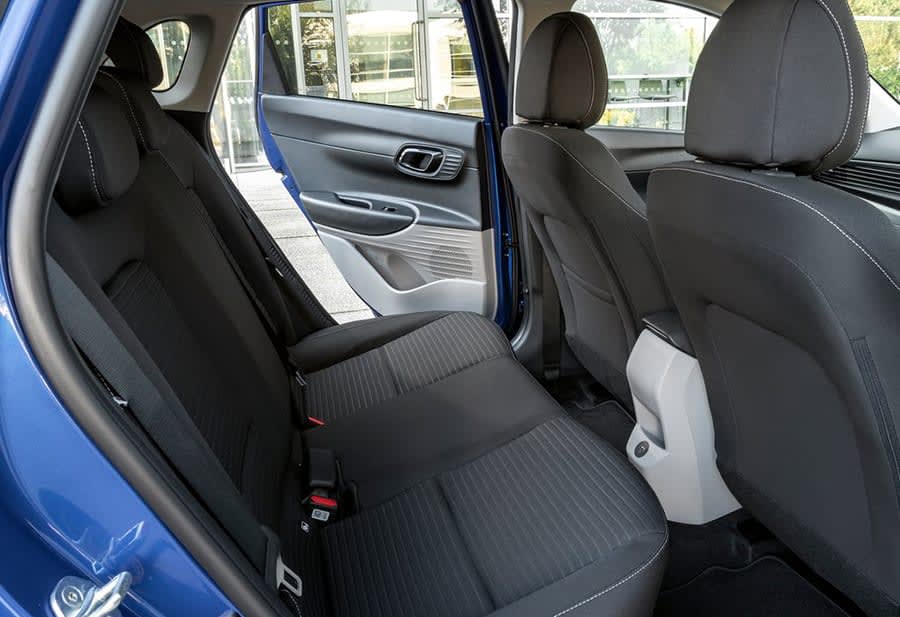
The boot is a very good size too, with a capacity of 352 litres. Compare that to the 292 litres you get in the Fiesta and you can see why the i20 is a practical choice for this type of car. It’s bigger than just about all of the competition, although the Volkswagen Polo’s boot is only a fraction smaller.
Fold down the rear seats in the Hyundai though and you’ll get more space than any of its main rivals. They fold flat in a 60/40 split with no lip between the seatbacks and the boot floor, which is great for carrying large items. However, there is a bit of a lip at the boot entrance.
General storage space is decent if not spectacular, with enough room for a wallet or phone in a cubby hole next to the gearstick, reasonable size door pockets and, on higher-spec cars, a space under the central armrest. There are two cup holders too. In the back, there are door pockets that’ll hold a drinks bottle with no issues, but there are no cup holders.
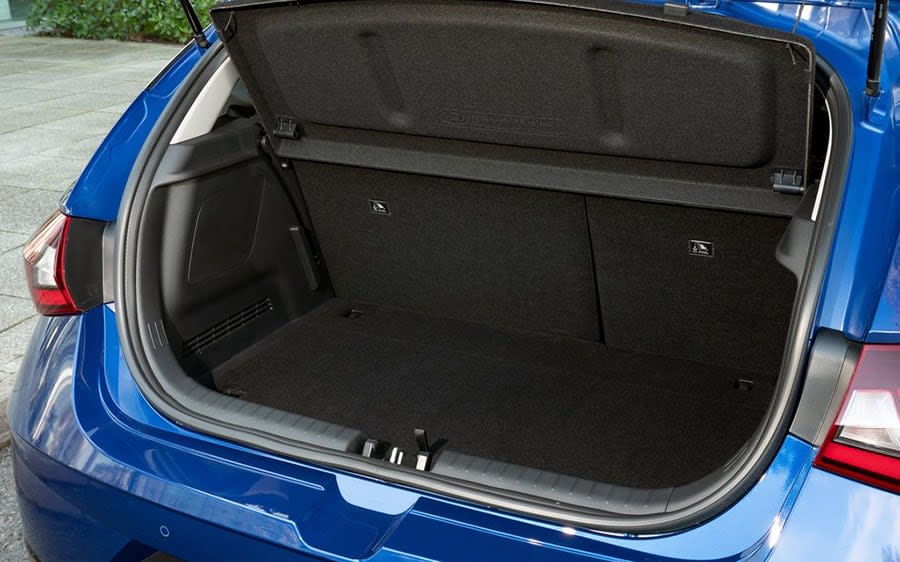
Safety
Safety organisation EuroNCAP has yet to test the latest generation of i20. The previous model was tested in 2015 and scored four stars out of five. The new version is packed with some of the latest tech available, although not on every model – the entry-level Element is notable bereft of features, which is unusual for a pretty new car.
Standard features on the rest of the range include automatic emergency braking and lane-keep assist, while the top-spec Ultimate model also includes blind-spot collision warning and lane following assist, which helps keep you in your lane without veering out. It also has an upgraded automatic emergency braking system that can spot cars turning out of junctions ahead of you.
All i20s have front, side and curtain airbags, and Isofix child-seat mounting points on the outer rear seats.
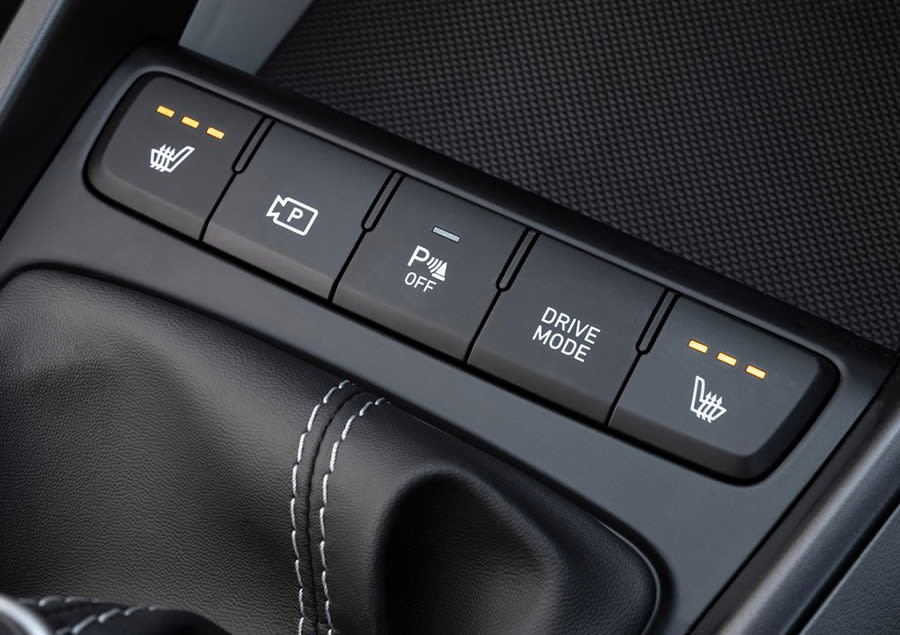
Options
The standard, non-performance i20 comes in five different trim levels. The entry-level model is the Element, which is the most affordable but misses out on quite a few features, including the notable safety features mentioned above. That said, it still features 16-inch alloy wheels, metallic paint and manual air conditioning, as well as cruise control, rear parking sensors and a reversing camera.
Next up is the SE Connect model, which adds automatic high beam headlights, the digital instrument panel and the missing safety kit, while the Premium model gets 17-inch wheels, heated steering wheel and front seats and climate control aircon, as well as the larger infotainment screen.
N Line has a sportier look, inspired by the performance i20N, as well as specific interior styling bits to make it look a bit flashier. It misses out on the heated seats and steering wheel, although it does get keyless entry and start.
Ultimate is the fully-loaded trim, with a black two-tone roof, black and grey interior, heated seats, Bose sound system and wireless phone charging. It also gets the extra safety features previously mentioned.
Options are limited to different paint colours and the optional two-tone roof.
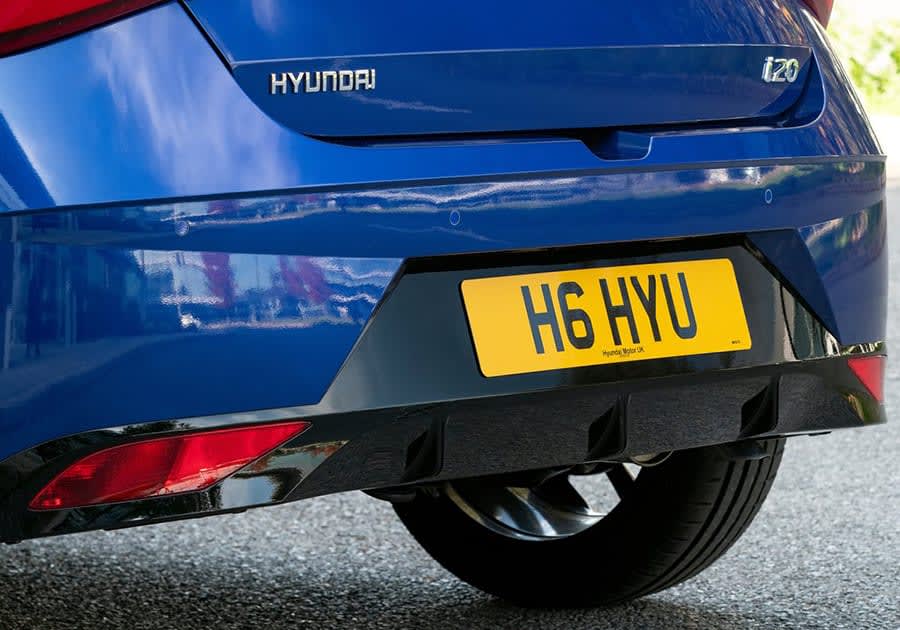
Rival Cars
The supermini hatchback section of the car market is a packed one, with myriad competitors vying to unseat the Ford Fiesta as Britain’s most popular car. The Fiesta holds that place for a reason – it’s really good, and the benchmark for a number of reasons, not least how good it is to drive and how affordable it is.
Other cars you should check out include the Volkswagen Polo, which feels slightly more upmarket than the Fiesta and the i20, while the Seat Ibiza is also good to drive and has a great interior.
Skoda’s latest Fabia represents great value for money with lots of practicality, and the Mini Hatch has lots of kerb appeal and is great fun to drive.
If you’re looking to maximise space for the money then check out the very affordable Dacia Sandero, while for sharp looks there’s the Peugeot 208, which is also available as an all-electric car.
Other electric superminis include the Vauxhall Corsa-e, Mini Electric, Renault Zoe and Nissan Leaf. For a full hybrid option, there’s the Toyota Yaris, Renault Clio E-Tech and the Honda Jazz, while customers considering the i20N performance model should also look at the brilliant Ford Fiesta ST, the Mini Cooper S and the Volkswagen Polo GTI.
Verdict & Next Steps
The Hyundai i20 is a great little hatchback with plenty to recommend about it. It comes in a choice of trim levels, all of which bar the entry-level model are very well equipped and come with plenty of safety kit. It’s got a big boot for this type of car, and it’s surprisingly engaging to drive.
The performance i20N is one of the best small hot hatches on the market, while the petrol engine in the regular car is punchy and efficient for the size. It’s a shame there aren’t more standard engine choices, however, and there are several rivals that are available for less each month.
All that said though, the i20 is a compelling all-round package, and Hyundai boasts an enviable reputation for reliability, so customers may decide that the overall quality of the car, and the amount of features it boasts, mean it’s still very worthy of a place on your supermini shortlist.
Where to next?
View latest Hyundai i20 Leasing Deals - from just £191.64 per month inc VAT**
Looking for a great leasing deal? Check out our incredible range of car lease deals
New Hatchback? Read our latest Car Reviews and find the right model for you
Want to know more about leasing? Take a look at our comprehensive Leasing Guides
Interested in everything motoring? Why not catch up on all the latest Car Leasing News.
**Score based on Select’s unique meta score analysis, taking into account the UK’s top five leading independent car website reviews of the Hyundai i20
**Correct as of 07/01/2022. Based on 9 months initial payment, 5,000 miles over a 48 month lease. Initial payment equivalent to 9 monthly payments or £1724.76 Ts and Cs apply. Credit is subject to status.




















